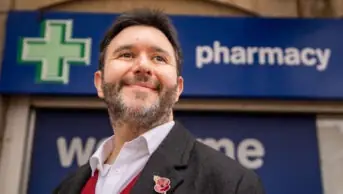
Royal Pharmaceutical Society
A government commission set up to look at the wellbeing of the pharmacy workforce could be completed quickly and would help support pharmacy teams, Ravi Sharma, director for England at the Royal Pharmaceutical Society (RPS), has told MPs.
Sharma was speaking at a House of Commons Health and Social Care Committee evidence session on recruitment, training and retention in health and social care on 24 May 2022. The inquiry had been set up to explore the reasons why staff choose to leave the health and social care sectors, and how to address them.
During the oral evidence session, Taiwo Owatemi, labour MP for Coventry North West, who is herself a pharmacist, asked Sharma: “If there was one change that the RPS would ask for, what would it be?”
In response, Sharma said that “from a workforce retention perspective, and to attract people to the profession, one of those bits would be to pass a policy to ensure that all pharmacists were able to get protected learning time to develop, right here, right now — that would be a very quick win”.
Sharma also told the committee that other “really quick wins that the government could do in the very short term” to support the profession included “a comprehensive workforce strategy for pharmacy that embeds structured career development for pharmacists wherever they may be working”.
He added that a “a commission from the government to look at workforce wellbeing pressures in relation to pharmacy” and [obtaining] “more comprehensive workforce data for pharmacy and pharmacy teams” could be done quickly and would help support the pharmacy workforce.
During a discussion on independent prescribing, Sharma noted that “there are 61,000 current pharmacists, but only 18% of them are independent prescribers — there is a task about how we train all pharmacists to become independent prescribers in the NHS”. He added that there is a need to ensure “access to supervisors and that there is parity of tariff systems so that there are equitable systems in remuneration and funding in place to allow supervision of pharmacy teams to become independent prescribers”.
Sharma also used the session to highlight reasons why some pharmacists said, in response to an RPS survey, that they were considering leaving the profession over the next 12 months. One of the reasons, particularly among primary care pharmacists, is a “lack of career development opportunity and a lack of job satisfaction because they are unable to use the clinical skills that they have”, he said.
Another major reason highlighted by Sharma was staff burnout, which he said was one of his biggest concerns: “89% of pharmacists are at risk of burnout. A third of the profession are considering leaving the profession in the next 12 months.”
The inquiry had previously called for written evidence; the RPS’s response can be read here.
Watch the evidence session here: https://www.parliamentlive.tv/Event/Index/f49b31dd-0724-4b81-9f0b-1d4c411cad0e
Read the transcript here: https://committees.parliament.uk/oralevidence/10301/pdf/


